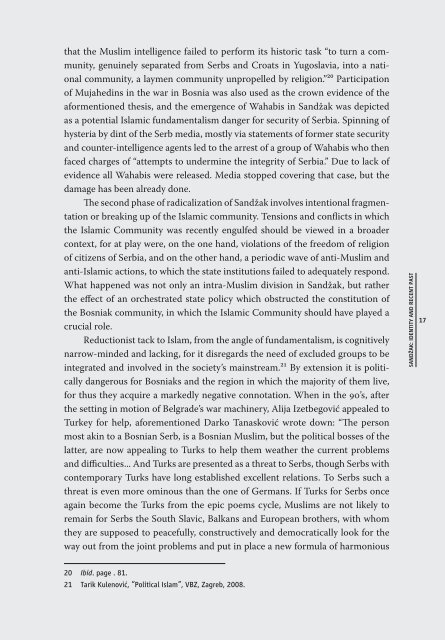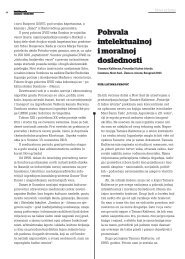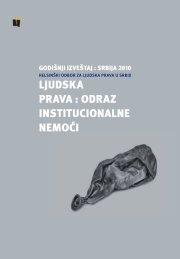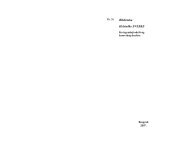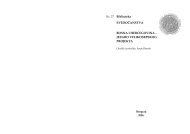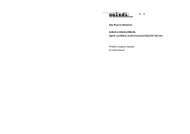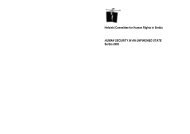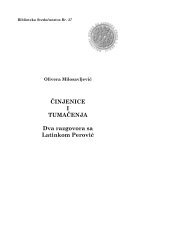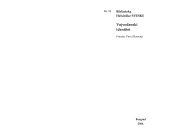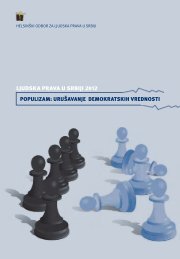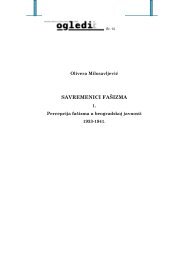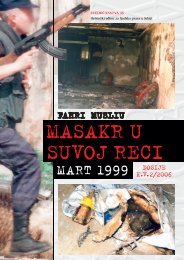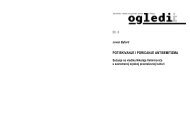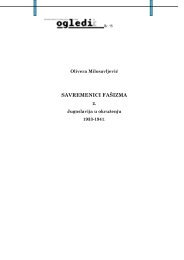r@mc @j hcdmshsds t oqnbdot rs@qnf h mnunf - Helsinki ...
r@mc @j hcdmshsds t oqnbdot rs@qnf h mnunf - Helsinki ...
r@mc @j hcdmshsds t oqnbdot rs@qnf h mnunf - Helsinki ...
Create successful ePaper yourself
Turn your PDF publications into a flip-book with our unique Google optimized e-Paper software.
Sandžak: identity and recent past<br />
that the Muslim intelligence failed to perform its historic task “to turn a community,<br />
genuinely separated from Serbs and Croats in Yugoslavia, into a national<br />
community, a laymen community unpropelled by religion.”²⁰ Participation<br />
of Mujahedins in the war in Bosnia was also used as the crown evidence of the<br />
aformentioned thesis, and the emergence of Wahabis in Sandžak was depicted<br />
as a potential Islamic fundamentalism danger for security of Serbia. Spinning of<br />
hysteria by dint of the Serb media, mostly via statements of former state security<br />
and counter-intelligence agents led to the arrest of a group of Wahabis who then<br />
faced charges of “attempts to undermine the integrity of Serbia.” Due to lack of<br />
evidence all Wahabis were released. Media stopped covering that case, but the<br />
damage has been already done.<br />
The second phase of radicalization of Sandžak involves intentional fragmentation<br />
or breaking up of the Islamic community. Tensions and conflicts in which<br />
the Islamic Community was recently engulfed should be viewed in a broader<br />
context, for at play were, on the one hand, violations of the freedom of religion<br />
of citizens of Serbia, and on the other hand, a periodic wave of anti-Muslim and<br />
anti-Islamic actions, to which the state institutions failed to adequately respond.<br />
What happened was not only an intra-Muslim division in Sandžak, but rather<br />
the effect of an orchestrated state policy which obstructed the constitution of<br />
the Bosniak community, in which the Islamic Community should have played a<br />
crucial role.<br />
Reductionist tack to Islam, from the angle of fundamentalism, is cognitively<br />
narrow-minded and lacking, for it disregards the need of excluded groups to be<br />
integrated and involved in the society’s mainstream.²¹ By extension it is politically<br />
dangerous for Bosniaks and the region in which the majority of them live,<br />
for thus they acquire a markedly negative connotation. When in the 90’s, after<br />
the setting in motion of Belgrade’s war machinery, Alija Izetbegović appealed to<br />
Turkey for help, aforementioned Darko Tanasković wrote down: “The person<br />
most akin to a Bosnian Serb, is a Bosnian Muslim, but the political bosses of the<br />
latter, are now appealing to Turks to help them weather the current problems<br />
and difficulties... And Turks are presented as a threat to Serbs, though Serbs with<br />
contemporary Turks have long established excellent relations. To Serbs such a<br />
threat is even more ominous than the one of Germans. If Turks for Serbs once<br />
again become the Turks from the epic poems cycle, Muslims are not likely to<br />
remain for Serbs the South Slavic, Balkans and European brothers, with whom<br />
they are supposed to peacefully, constructively and democratically look for the<br />
way out from the joint problems and put in place a new formula of harmonious<br />
SANDŽAK: IDENTITY AND RECENT PAST<br />
17<br />
20 Ibid. page . 81.<br />
21 Tarik Kulenović, “Political Islam”, VBZ, Zagreb, 2008.


